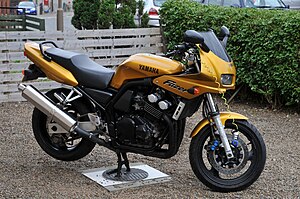This article needs additional citations for verification. (May 2015) |
 FZS600 Fazer | |
| Manufacturer | Yamaha |
|---|---|
| Successor | Yamaha FZ6 Fazer |
| Engine | 599 cc liquid cooled DOHC 16 valve inline-four |
| Bore / stroke | 62.0 mm × 49.6 mm (2.44 in × 1.95 in) |
| Compression ratio | 12:1 |
| Top speed | 135 mph (217 km/h)[1] |
| Power | 95 hp (70.8 kW) (claimed)[2][1][3] |
| Torque | 45 lb⋅ft (61 N⋅m) (claimed)[2][4] |
| Ignition type | Transistorised Coil Ignition |
| Transmission | Six speed manual, chain final drive |
| Frame type | Tubular steel double cradle |
| Suspension | Front telescopic forks; rear swingarm with single shock absorber |
| Brakes | Front: Twin 298 mm (11.7 in) disc brakes; Rear: 245 mm (9.6 in) disc brake |
| Tyres | Front: 110/70 ZR17 (54 W); Rear: 160/60 ZR17 (69 W) |
| Rake, trail | 24°, 88 mm (3.5 in) |
| Wheelbase | 1,415 mm (55.7 in)[2] |
| Dimensions | L: 2,080 mm (82 in)[2] W: 710 mm (28 in)[2] H: 1,170 mm (46 in)[2] |
| Seat height | 790 mm (31 in)[2] |
| Weight | 189 kg (417 lb)[1] (dry) |
| Fuel capacity | 18 L (4.0 imp gal; 4.8 US gal) 20 L (4.4 imp gal; 5.3 US gal) MY2000 onwards |
| Fuel consumption | 55 mpg‑imp (5.1 L/100 km; 46 mpg‑US)[1] |
| Turning radius | 2,900 mm (110 in) |
| Related | Yamaha YZF600R Yamaha FZS1000 |
The Yamaha FZS600 Fazer is a sport motorcycle produced by Yamaha between 1998 and 2004. It is the predecessor of the Yamaha FZ6. During its production run, it underwent several changes before being discontinued in 2004 due to European emissions laws coming into force.[5]
The FZS600 was first unveiled at the Paris Auto Show in 1997, and shares parts from other Yamaha models, notably the engine from the YZF600R Thundercat, detuned to give more mid-range power, and the front discs and blue-dot calipers from the YZF-R1.[6][7] Revisions for the 2002 model saw a newer more modern styled fairing similar to the FZS1000 Fazer. This used a newer and better headlight design, an often mentioned criticism of the launch bike.[8] The Fazer is a well reviewed motorcycle that is generally considered reliable although many owners have reported problems caused by a weak front sprocket nut.[4] Yamaha has since issued a redesigned thicker nut (12 mm vs 9 mm) to counteract the issue.
- ^ a b c d Cite error: The named reference
mcnfazerreviewwas invoked but never defined (see the help page). - ^ a b c d e f g Cite error: The named reference
yamahaspecsheetwas invoked but never defined (see the help page). - ^ Cite error: The named reference
onemorewas invoked but never defined (see the help page). - ^ a b "Top 10 First Big Bikes - 02. Yamaha FZS600 Fazer (1998-2004)". Visordown. 8 June 2010. Retrieved 2015-06-19.
- ^ Cite error: The named reference
mcnfz6reviewwas invoked but never defined (see the help page). - ^ Cite error: The named reference
visordownvswas invoked but never defined (see the help page). - ^ Cite error: The named reference
cycletorquetestwas invoked but never defined (see the help page). - ^ Cite error: The named reference
visordownvsfz6was invoked but never defined (see the help page).